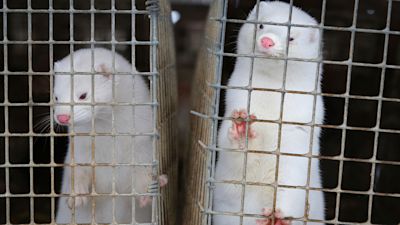Danes on alert for mutant mink Covid-19 strain
Tom Clarke
Former Science Editor

Denmark has ordered its military to cull all farmed mink in the country after 12 people have been infected with strain of COVID-19 that has mutated while circulating in the country's 17 million-strong mink population. At a press conference today Danish Prime Minister Mette Frederiksen said the mink strain had mutated in the critical spike region of the virus genome.
The new strain also reacted more weakly to human antibodies against normal SARS-CoV-2.
She went on to say if the mutant strain became widespread it could undermine efforts to develop a vaccine. Virologists however immediately cautioned that it's too early to conclude the "mutant" mink strain is a functionally different ordinary strain. Last month Denmark ordered a cull of 2.5 million mink after animals on 207 farms were found to have COVID-19.
That cull has now been broadened out to all 1,500 or so of Denmark's mink farms. It's the largest mink producer in Europe producing 40 million pelts a year for the fur trade. Ms Frederiksen said the army and Danish emergency management agency would be deployed to cull the mink. Having COVID-19 circulating in farm animals can provide a dangerous reservoir for the virus, putting farm or slaughter-house workers at risk.
However, it also offers a newly emerged virus like SARS-CoV-2 the opportunity to mutate as it jumps from humans into mink and back again.
These jumps or "zoonotic events" are what drive the emergence of new pathogens - as is thought to be the case with SARS-CoV-2 when it left an as-yet-to-be-identified animal host (or hosts) in China and found its way into humans. Experts urge calm until more data has been made available. "Don't panic," wrote Dr Emma Hodcroft on Twitter.
Her team at the University of Basel in Switzerland is tracking strains of COVID around the world.
"Until more data is provided it is very difficult for any scientist to provide more context for the public who are reacting to this with alarm and a lot of questions," she said. Viruses mutate constantly, most mutations are meaningless in terms of their ability to infect people more easily or make them sicker.
According to the Danish authorities there is no indication so far that the mink mutant causes more severe disease.